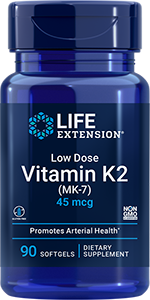|
|
|
Tuesday, May 24, 2016
Findings from a study reported at the Experimental Biology 2016 meeting held in San Diego reveal an association between daily vitamin D supplementation and improved telomerase activity in Hispanic type 2 diabetics with vitamin D insufficiency. Telomerase is an enzyme involved in the maintenance of telomeres: DNA sequences that cap and protect the ends of chromosomes. Low telomerase activity is linked with shorter telomeres, which are associated with type 2 diabetes and premature mortality. The findings were published in a supplement to the April 2016 issue of The FASEB Journal.
Thirty-four type 2 diabetics recruited from two Miami-Dade County, Florida clinics were included in the current study. Measurement of serum 25-hydroxyvitamin D in fasting blood samples collected from the participants upon enrollment indicated insufficient levels averaging less than 30 nanograms per milliliter (ng/mL). Telomerase activity levels were evaluated at the beginning of the study, at three months and at the end of the six month intervention. Participants received 4,000 international units (IU) vitamin D3 daily throughout the course of the trial.
Telomerase activity levels increased from an average of 49.3 at enrollment to 63.1 RTA (relative telomerase activities) after six months. "Vitamin D3 supplementation at 4000 IU/day significantly increased telomerase activity in Hispanics with type 2 diabetes," conclude authors Gustavo G. Zarini and colleagues at Miami's Florida International University. "Vitamin D3 supplementation may prevent/delay disease progression in type 2 diabetes through telomerase reactivation and maintenance of DNA."
|
|
|
| |
|
|
What's Hot |
|
|
|
Meta-analysis reveals lower risk of mortality in association with increased vitamin D over up to 29 years of follow-up |
|
|
|
 |
|
| |
A review and meta-analysis published on April 1, 2014 in the British Medical Journal adds more evidence to an association between a higher serum level of vitamin D and a lower risk of death from any cause over follow-up periods ranging from 0.3 to 29 years. The international team of researchers also uncovered a reduction in the risk of premature death in association with the use of vitamin D3 supplements.
Rajiv Chowdhury and colleagues selected 73 observational cohort studies that reported serum 25-hydroxyvitamin D levels and the cause of deaths that occurred among 849,412 men and women over follow-up. The analysis uncovered a 35% higher risk of death from cardiovascular disease or from any cause over follow-up among those whose vitamin D levels were in the lowest one-third of subjects in comparison with those whose levels were among the highest third. For non-vascular, non-cancer deaths, the risk was 30% higher and for cancer deaths, the risk was 14% higher among those in the lowest one-third of serum vitamin D.
Analysis of 22 randomized controlled trials of vitamin D supplements, involving a total of 30,716 participants, revealed an 11% lower risk of dying over three to seven years of follow-up among those who received vitamin D3 in comparison with a placebo or no treatment. As possible mechanisms for vitamin D in the prevention of premature mortality, the authors list a range of biological responses activated by vitamin D, involvement of the vitamin in gene regulation, association with increased white blood cell telomere length, and a relationship between low levels of vitamin D with suboptimal lifestyle and socioeconomic circumstances.
They recommend further investigations to establish optimal vitamin D3 dose and duration.
|
|
|
| |
|
|
|
|
Health Concern
Diabetes |
|
|
Vitamin D has far-reaching implications that extend beyond promoting bone health. Over the past 40 years, research has shed light on the intersecting pathways of vitamin D and many other aspects of health.
Evidence from animal experiments and human observational studies suggests that vitamin D may help prevent type I diabetes, perhaps by acting as an immune system modulator (Zittermann 2007). Researchers demonstrated that the pancreatic β-cells of mice contain receptors for 1,25-dihydroxyvitamin D. When they administered this active form of vitamin D to mice early in life, the animals demonstrated a reduced incidence of type I diabetes. However, diabetes incidence was not affected when 1,25-dihydroxyvitamin D was administered to mice later in life. Vitamin D appears to limit the expression of certain cytokines, which may prevent the autoimmune attack on pancreatic cells that can lead to diabetes (Targher 2006).
Vitamin D supplementation may reduce susceptibility to type II diabetes by slowing the loss of insulin sensitivity in people who show early signs of the disease. Researchers studied 314 adults without diabetes and gave them either 700 IU of vitamin D and 500 mg of calcium daily or a placebo for three years (Pittas 2007). Among subjects who had impaired (slightly elevated) fasting glucose levels at the study's onset, those taking the active supplement had a smaller rise in glucose levels over three years than did the controls, as well as a smaller increase in insulin resistance. The researchers concluded that for older adults with impaired glucose levels, supplementing with vitamin D and calcium may help avert metabolic syndrome and type II diabetes.
|
|
|
| |
|
|
Latest Products |
|
|
 |
Low-Dose Vitamin K2, 45 mcg, 90 softgels
Item #01936
|
Vitamin K2 (menaquinones) is found in meat, eggs, and dairy products and is also made by bacteria in the human gut, which provides a certain amount of the human vitamin K requirement. Human studies show that vitamin K2 is up to ten times more bioavailable than K1. Vitamin K2 remains biologically active in the body far longer than K1. For instance, K1 is rapidly cleared by the liver within eight hours, whereas measurable levels of K2 (MK-7) have been detected 72 hours after ingestion.
The Rotterdam Heart Study, a large-scale, well-controlled clinical trial that tracked 4,800 participants for seven years, revealed that participants who ingested the greatest quantities of vitamin K2 in their diet experienced a better cardiovascular condition than people who ingested the least.
Low-Dose Vitamin K2 contains the menaquinone-7 form of vitamin K2, which is not metabolized quickly by the liver, thereby making it available to provide a more consistent supply of vitamin K to the body.
|
Disease Prevention and Treatment, 5th Edition
Stay healthier longer with the updated 5th Edition of Life Extension's Disease Prevention and Treatment.
Item #DPT05
|
Imagine, over 1,400 pages of breakthrough information that bridges the gap between cutting-edge science and mainstream medicine ... in one must-have volume that you'll find invaluable now and for years to come. This is information you simply won't find anywhere else, published by an organization passionate about keeping you younger and healthier longer.
It's been Life Extension's mission for over 35 years to provide you with this kind of lifesaving information. So we've packed this 5th edition of Disease Prevention and Treatment with the latest evidence-based protocols, addressing 130 different health concerns. All are documented by thousands of published studies from scientific journals, and provide detailed suggestions that can help you break free of the "one-size-fits-all" approach to disease management.
|
|
|
|
|
|
Related Life Extension Magazine® Articles |
|
|
|
|
|
|











